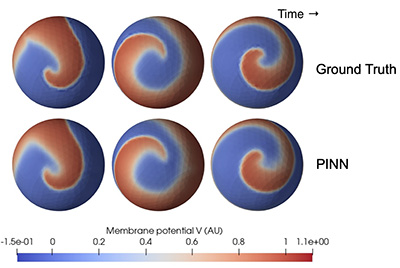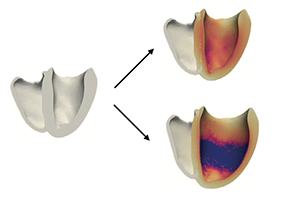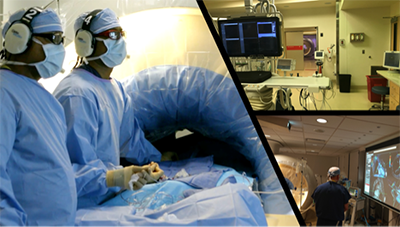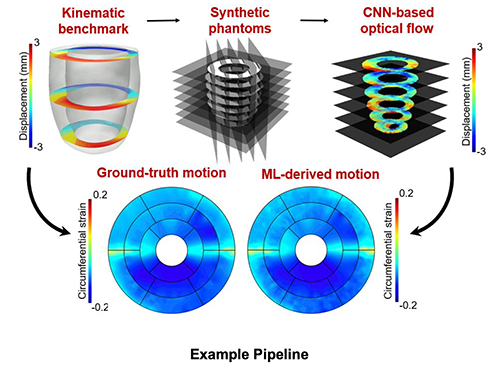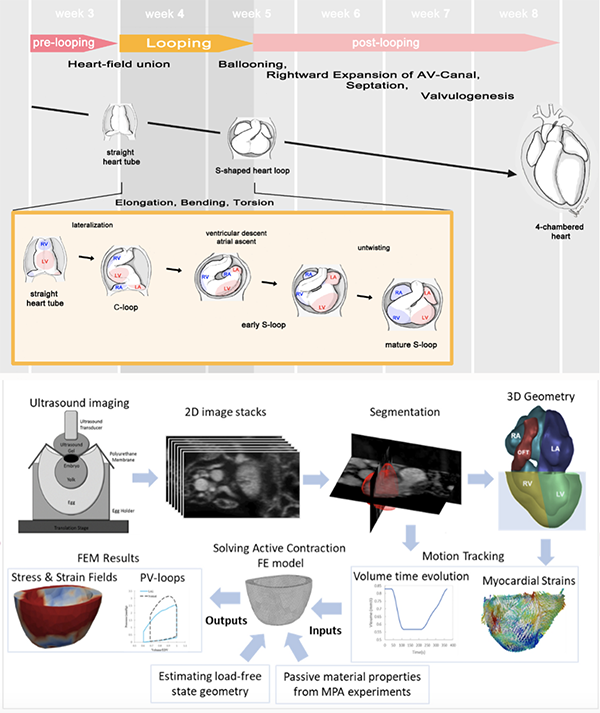
|
|
|
Satellite EventsCURRENT LIST OF SATELLITE EVENTS (further details will be provided and the list updated)
1. Tutorial: Heart-PINNs - Using Physics-Informed Neural Networks to Characterize Cardiac Properties Organizers:
For most recent information, see: HeartPINNs_FIMH25TutorialProposal.pdf Description: PINNs are an increasingly popular deep learning framework that explicitly incorporates physical equations into the data learning process. PINNs approximate a solution to a given physical process which simultaneously agrees with the known data and conforms to the known equations and associated boundary/initial conditions. By incorporating mechanistic knowledge into their loss function, PINNs can learn from much smaller amounts of data than conventional neural networks (NNs). Moreover, they can be constructed to be consistent with the known physics laws, making them more trustworthy than conventional NNs. In the cardiovascular field, PINNs have been used for simulation of physiology and pathophysiology, inverse estimation of cardiovascular parameters, characterization of pathology and high-resolution analysis of cardiac signals and images. For this tutorial, we will build on the materials created for a tutorial on “PINNs for Medical Imaging” successfully presented at MICCAI 2024 by two of the applicants – see https://annien094.github.io/PINNs-tutorial-MICCAI-2024.
2. Workshop: Computational modeling of cardiac remodeling Organizers:
For most recent information, see: FIMH25_cardiac_remodeling_program.pdf Description: Cardiac remodeling describes the heart’s adaptation to various bio-chemical, -mechanical, and electrophysiological stimuli. It is a crucial mechanism in heart disease or chronic pathological conditions, such as single-ventricle heart disease, myocardial infarction, or heart failure, ventricular volume-/pressure-overload (e.g., in valvular diseases) and thus a promising target for computational modeling. This multi-disciplinary workshop will combine perspectives from clinical practice, medical imaging, cardiac mechanobiology, and computational modeling to discuss model use cases, generation, and validation. Clinical motivation and perspective will be given by clinical speakers from UT Southwestern Medical Center Dallas:
More details and list of all speakers will be provided closer to the workshop date.
Gebauer AM, Pfaller MR, Szafron JM, Wall WA. Int J Numer Methods Biomed Eng (2024)
3. Workshop: Fluid Simulations of the Left Atrium Organizers:
For most recent information, see: Workshop_FIMH2025_FLAMES_Agenda.pdf Description: The workshop aims to foster collaboration, innovation, and knowledge exchange among researchers in the field of left atrial fluid simulations. It will serve as a platform to benchmark different modeling strategies, promote best practices in verification and validation (e.g., V&V40 guidelines), and jointly work toward improved simulation methods. Participants will have the opportunity to collaborate on common datasets, fostering a sense of community and driving advancements in the field. The event will feature discussions on the state-of-the-art in left atrial fluid dynamics, as well as a collaborative effort to produce a review paper. Virtual participation will be available to ensure broad engagement. Our focus is on compiling and sharing unique datasets that will be made publicly available to the research community. These datasets include: In vitro data (Experimental measurements from a 3D-printed left atrium phantom using Particle Image Velocimetry (PIV)). Patient-specific geometries and 4D flow MRI data (including cases before and after Left Atrial Appendage Occlusion (LAAO) and CT datasets with known thrombus presence.
4. Workshop and Live Case: Interventional Cardiovascular Magnetic Resonance (iCMR) Organizers:
For most recent information, see: iCMR_workshop_program.pdf Description: Interventional Cardiovascular Magentic Resonance (iCMR) offers a unique contribution to high fidelity phenotypic characterization of the cardiovascular system. The combination of invasive hemodynamic pressures, high definition geometry and physiological flow & motion analysis provides unique contribution to personalized biomechanical modeling. This workshop will feature a live case study to take the participants through the fundamentals of image acquisition and data acquisition. The participant will follow the patient journey with livestream from the clinical area. Lectures will include technical aspects of iCMR data acquisition, data processing and interpretation. Discussion will center around processing of multi-modality data including data synchronization, data assimilation into models (data-model coupling including data filtering by biophysical models and model-augmented data analysis). Data sharing strategies will be as well discussed.
5. Workshop: Cardiac Kinematics Organizers:
For most recent information, see: FIMH2025_CardiacKinematicsWorkshop_Agenda.pdf Description: Following the 1st and 2nd Cardiac Kinematics Workshop held in conjunction with FIMH 2021 and FIHM 2023, this workshop aims to continue the community-wide discussion on developing robust pipelines and measures of cardiac strains that can be adopted into clinical practice. Imaging-based derivation of cardiac strains can serve as mechanistic, regional, and functional biomarkers to facilitate clinical assessment and contribute to the development of precision medicine. However, to date, cardiac strains are still not routinely measured in clinical practice. The overall goals of this workshop are to: 1) Identify the kinematic measures that would be most useful in the clinic; and 2) Define the main obstacles (e.g., automation, reliability, implementation) to their adoption. We will discuss global and local measures of cardiac motion, strains computed from different imaging modalities, and validation pipelines (for example using phantoms). This workshop will continue the community’s discussion on the robustness of kinematic measures; define the best ways to compute them from available data; and identify which parts of the pipelines we should improve. A potential outcome is a workshop-based list of defined goals for tests and/or challenges on computing useful kinematic measures and strains from available clinical images.
6. Tutorial: In-silico phantom simulations for AI-powered 4D cardiac motion estimation Organizers:
For most recent information, see: FIMH_Workshop_4Dmotion_phantom_Outline.pdf Description: Cardiac motion tracking is increasingly essential as a diagnostic tool for many structural heart diseases. Several image processing techniques have been adapted to evaluate quantifiable indices of mechanical properties such as strains and stiffness. Despite increasing relevance in pre-clinical research, the clinical translation of such elasticity imaging techniques is challenged by the lack of “ground truth” of these indices. Dependencies on calculation algorithms and imaging modalities significantly contribute to the variabilities measured for these indices. The standardization of these methods would greatly benefit from establishing a rigorous validation protocol that sets a “ground truth” kinematic benchmark to identify the most reliable assessment of tissue biomechanics in vivo. Accordingly, we propose a workshop/special session on developing synthetic images obtained from in silico finite element simulations to train, test, and validate deep learning (DL) models of motion estimation. The intended models will facilitate reproducible estimates of tissue properties with immediate applications in assessing four- dimensional cardiac motion as a regional biomarker for structural heart diseases. The workshop will demonstrate unique simulations to evaluate and apply 4D cardiac motion estimation using (i) synthetic and subject-specific echocardiography images, (ii) the development of super-resolution cardiac magnetic resonance images, and finally, applications in (iii) 4D fluid-structure interactions within the left ventricle. Demonstrations will include a complete walkthrough of generating phantoms from the simulations, followed by developing a comprehensive dataset to train DL models. Since the proposed workshop involves hands-on demonstration with broad application to the functional imaging and modeling of the heart, we believe its impact will be more significant in a workshop/special session format than a standard FIMH presentation. This workshop will impact a diverse audience of researchers in different imaging and biomechanical settings, with a focus on establishing rigorous image processing protocols that are not easily implementable in traditionally used in-vitro phantoms. Our proposal aligns well with the theme of FIMH on innovation and technologies, with the workshop providing the link between traditional research in functional medical imaging and modeling, offering to significantly improve the clinical impact of elasticity imaging techniques. The simulation results and Python code will be hosted on GitHub, thus requiring no more than their laptops for the workshop.
7. Workshop: Cardiac Development and Biomechanical Modeling Organizer:
For most recent information, see: program_cardiac_development_workshop_FIMH_2025.pdf Speakers:
Description: The heart is sculpted by a precisely orchestrated developmental program and undergoes simultaneous structural and functional maturation while it transforms in a dynamic and complex process from a straight tube to a four chambered heart within the first 8-9 weeks in human pregnancy. It is during this short period of time, especially within the early and critical phases of heart formation, such as cardiac looping, that most congenital heart diseases (CHD) originate. Various genes and a series of transcription factors that are important during heart development were defined and characterized by means of transgenic mice models. However, the role of epigenetic factors during heart development, such as biomechanical properties and biophysical factors, fluid forces, and blood flow, has been significantly underestimated. This dedicated workshop during FIMH 2025 aims to shed some new light on ongoing efforts in basic research on Cardiac Development and Biomechanical Modeling and will address following topics presented by leading experts in this field:
|
